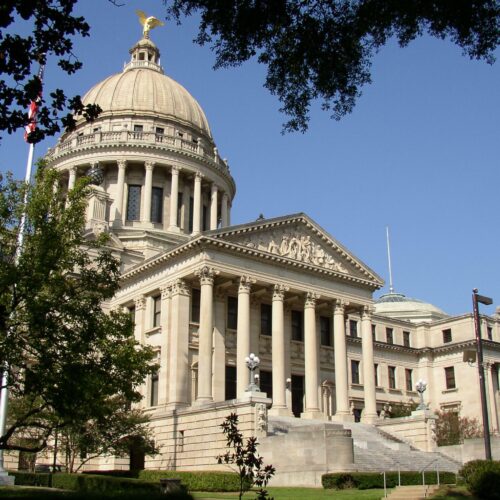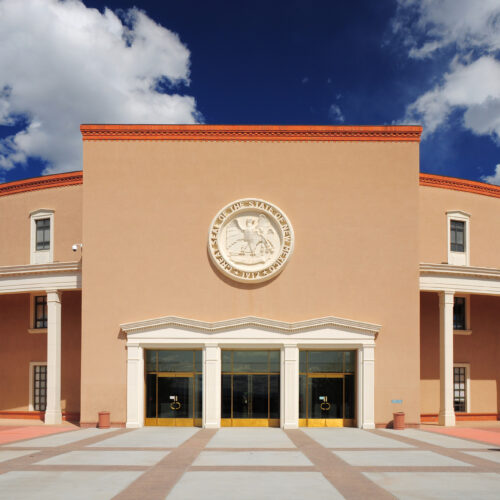Flaws in West Virginia indigent defense system result in non-lawyer representing indigent defendants

Pleading the Sixth: In Logan County, West Virginia, a recent law school graduate who never passed the bar exam was allowed to represent the indigent accused in misdemeanor court. This is an obvious violation of the Sixth Amendment right to counsel, and it exposes flaws in the structure of West Virginia’s indigent defense system.
In West Virginia, as in most states, there are limited circumstances in which law students and law school graduates who have not yet passed the bar exam can represent a person in court. This typically occurs only under the direct supervision of a licensed attorney who is physically present at all times during the representation and only with the express written consent of the client. Further, the West Virginia Rules for Admission to the Practice of Law, Rule 10.0 – 10.4 specifically provide that a law school graduate who does not pass the bar exam at the first available sitting after graduation is not eligible to represent clients.
On September 12, 2016, the Chief Judge of the Seventh Circuit (Logan County) issued an administrative order permitting the law school graduate to “appear and advocate for clients” of the law firm in Magistrates Court. The law grad worked for a local law firm that was regularly appointed to represent indigent defendants in conflict cases. Allegedly, the law school graduate never mentioned to the clients that he was not a lawyer, and it seems he represented an unknown number of defendants without any attorney supervisors present for up to four months, at which time the judge rescinded the order. The number of affected defendants is unknown, in part because Magistrates Courts in West Virginia are not courts of record.
“I feel like I was set up for failure from the beginning,” explained one woman to WOWK 13-News, upon learning that the person representing her was not an attorney. “I was just shocked. I felt like I was violated. How do you even be defended by somebody that isn’t even a lawyer. I’m going to be accused of something and he had no right to represent me.”
Although the full story is still developing in Logan County, what we do know for certain is that a structural flaw in the manner in which the State of West Virginia provides indigent defense services permits the type of undue judicial interference alleged. Specifically, the law grad, the law firm, and/or the judge may have committed ethics violations by knowingly denying counsel to misdemeanor defendants. Let us explain.
Indigent defense services in West Virginia
The West Virginia indigent defense system has many structural safeguards, including 100% state funding and a statewide commission. However, not all state funded and administered systems are equal.
West Virginia Public Defender Services (WVPDS) is an executive branch agency housed in the Department of Administration. The executive director of WVPDS is appointed directly by and serves at the pleasure of the governor. The WVPDS executive director chairs a 9-member commission that has legislative authority to set standards for the performance and training of public defense attorneys throughout the state. It also oversees a trial-level resource center and an appellate defender office.
At the trial level, WVPDS determines how right to counsel services are delivered in all of the state’s 55 counties. In 31 counties, WVPDS has established public defender corporations that operate like public defender offices elsewhere in the country. These are non-profit organizations that contract with WVPDS to provide right to counsel services. Each corporation has a board of directors that is appointed jointly by the governor, the county commission, and the local bar association. WVPDS hires the chief of each public defender corporation.
Private attorneys are paid hourly to represent indigent defendants in the 24 counties where WVPDS has not established a public defender corporation, and private attorneys similarly provide representation in conflict situations in all 55 counties. The local judges choose and appoint these private attorneys to represent the indigent and approve the attorneys’ vouchers to be paid by WVPDS. Although the WVPDS qualification and performance standards apply to all attorneys who are appointed to represent indigent people, WVPDS does not have any authority over which attorneys are chosen by the judges to provide representation. Only the local judges have authority over the private attorneys whom they choose to appoint, and judges are the only people who can remove those private attorneys for poor performance.
Undue judicial interference
Judicially controlled indigent defense systems often follow or adjust to the needs of each judge in each court, rather than focusing on providing constitutionally effective services for each and every defendant. Although no two indigent defense structures are identical, undue judicial involvement almost always takes one or more of the following forms: judges hand-selecting and qualifying attorneys to take cases; judicial determinations of how much the attorneys are paid and by what method (e.g., by annual contract or hourly fee); and/or determining if a request for an expert witness or an investigator has merit and will be funded.
This interference has real-world consequences for defenders that are often passed on to clients. For example, fearing the loss of their jobs by not pleasing the judge who hired or supervises them, defenders will often take on more cases than they can ethically handle, delay working on cases, and triage their hours available in favor of some clients but to the detriment of others. When defenders do this, they fail to meet the parameters of ethical representation owed to all clients. It does not take a judge to say overtly: “Do not file motions in my courtroom.” Defense attorneys will bring into their calculations what they think they need to do to garner favor with a judge in order to get the next appointment or contract. When public defense attorneys take into consideration what must be done to please the judge to get their next appointment or contract, by definition they are not advocating solely in the interests of a client as is their ethical duty.
In 6AC’s experience, most undue judicial interference occurs where judges are not overtly trying to control the defense of the indigent. But overt interference is a possibility when a system is structured to have judges overseeing defense services. For example, a 2000 study commissioned by the State Bar of Texas reports that “[n]early four in ten (39.5 percent) judges indicate that their peers occasionally appoint an attorney because he or she is a friend, while roughly one-third of judges sometimes consider whether the attorney is a political supporter (35.1 percent) or has contributed to their campaign (30.3 percent).” There is simply no place in criminal justice systems for such undue judicial and political interference in the delivery of the right to counsel.
The United States Supreme Court agrees. The Court has declared that states have a “constitutional obligation to respect the professional independence of the public defenders whom it engages.” Specifically, Strickland v. Washington states that “independence of counsel” is “constitutionally protected.”
To fully understand the weight of this statement on the potential undue interference of the judiciary over the public defense function, Strickland should be read in conjunction with another case decided on the same day: United States v. Cronic. Cronic sets out the systemic deficiencies that may result in a constructive denial of counsel – e.g., the inability of a defender system to subject the state’s case to the “crucible of adversarial testing” even when a lawyer is present to represent the indigent accused. To demonstrate the type of systemic deficiencies they mean, the Cronic court points to the deplorable representation at issue in Powell v. Alabama.
Though there are a number of issues the Court raises with the defense in Powell, the involvement of the trial judge in selecting and directing counsel was of particular importance. In Powell, the Court directly questions the efficacy of judicial oversight and supervision of the defense, asking: “[H]ow can a judge, whose functions are purely judicial, effectively discharge the obligations of counsel for the accused? He can and should see to it that, in the proceedings before the court, the accused shall be dealt with justly and fairly. He cannot investigate the facts, advise and direct the defense, or participate in those necessary conferences between counsel and accused which sometimes partake of the inviolable character of the confessional.”
The Powell decision underscores the fact that it is not that judges who directly oversee indigent defense services are somehow “bad” people. On the contrary, it is simply that a judge can never know everything about a case to determine if an attorney’s decision, for example to file or not file a particular motion, is in the stated interest of the particular client, because the judge cannot review the case file, or interview the client privately, or conduct a separate investigation of the facts.
National standards of justice reflect the aims of the U.S. Supreme Court. The ABA Ten Principles explicitly require that the “public defense function, including the selection, funding, and payment of defense counsel, is independent.” In the commentary to this standard, the ABA notes that the public defense function “should be independent from political influence and subject to judicial supervision only in the same manner and to the same extent as retained counsel[,]” noting specifically that “[r]emoving oversight from the judiciary ensures judicial independence from undue political pressures and is an important means of furthering the independence of public defense.”
The constitutional imperative for defender independence and the prohibition of judges from oversight of indigent defense services does not mean that judges do not have a critical role to play in the delivery of public defense services. They do. Judges have a unique view of defender performance in the courtroom. Unprofessional conduct, habitual tardiness, and general unpreparedness should not be tolerated whether it occurs in the prosecution or defense of the indigent. Judges should alert the management of both sides of the aisle if lawyer conduct or actions are disruptive. In constructing an indigent defense system, a regular procedure should be developed to give judges an avenue to regularly comment on a defender’s in-court performance.
What next for West Virginia?
While it is encouraging that the Chief Judge of the Seventh Circuit in West Virginia rescinded his order allowing the non-lawyer to represent indigent defendants, each and every person that non-lawyer purported to represent was denied their Sixth Amendment right to counsel – they did not receive a lawyer, even when facing charges carrying jail time. A higher court should immediately appoint lawyers to all of the affected people to assist them in vitiating any activity that occurred in their cases and to represent them going forward. To be clear, the defendants may still be prosecuted, but only if their right to the effective assistance of an attorney is fulfilled.
West Virginia policymakers can – and should – go a step further and ensure that the right to counsel throughout the state is independent of both the judicial and political branches of government. Because the state is ultimately responsible for ensuring that the Sixth Amendment right to counsel is protected, the WVPDS rather than local judges should qualify and oversee all of the attorneys who are appointed to represent indigent defendant.
Massachusetts, for example, is much like West Virginia in the effort to maintain as much local control as possible over indigent defense services while still ensuring that the state has sufficient oversight to uphold its constitutional obligations. The statewide Committee for Public Counsel Services (CPCS) oversees both primary defender offices and the attorneys who take cases when the primary defender has a conflict of interest. CPCS’s performance standards and qualifications bind all attorneys, and CPCS can remove defenders or cancel contracts for poor performance or non-performance. Local decisionmakers in the form of county bar commissions still make the day-to-day hiring decisions and supervise attorneys under the standards set out by CPCS, leaving considerable local control.
And, indeed, WVPDS supported legislation this past session calling for the authority to create conflict public defender corporations, contract directly with consortia of attorneys for representation in specialized cases, and shift authority for voucher approval from the judiciary to WVPDS. The bill passed the Senate but not the House.
Conclusion
Should a similar bill be entered next year, West Virginia legislators should consider changing the make-up of the WVPDS commission itself to prevent undue political interference. Currently, the governor appoints all 9 members of the commission: the executive director of WVPDS; one former or retired circuit judge; three experienced criminal defense lawyers (one from each of the state’s Congressional districts); one sitting chief public defender; one non-lawyer; one mental health or developmental disability advocate; and one juvenile justice advocate. National standards require that diverse authorities make appointments to the commission so that no single branch of government may exert undue interference. And, national experience suggests that people who have a financial interest in commission policies (e.g., public defenders and private attorneys taking public cases) should not serve on an indigent defense commission. Importantly, the reconfigured commission, rather than the governor, should select the director of WVPDS and that director should be removable only for good cause.


